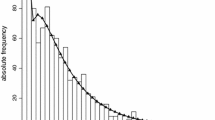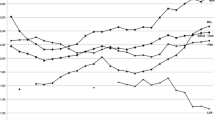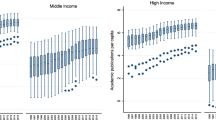Abstract
The main objective of this paper is to provide an empirical insight into the changes in the basic characteristics of the knowledge production mode and of scientific productivity in the Croatian research system in the transitional period. Empirical analysis is based on the results of two comparable questionnaire studies. The first survey was conducted in 1990 and the sample covered 921 respondents, while the second survey was conducted in 2004 with a sample of 915 respondents. The central characteristics of the knowledge production mode and of productivity confirm an expected duality: the features that accompany the introduction of a competitive system of research funding and evaluation on the one hand, and the anachronistic and newly acquired peculiarity of the research system on the other. Thus, the gap between the improved scientific performance of the researchers and the conditions in which they work has deepened. Scientific productivity still lags behind the productivity of the (developed) countries. Though Croatian researchers publish less, they follow basic global trends in the structure of publications, especially the rise in foreign and co-authored works.
Similar content being viewed by others
References
Albert, M. (2003), Universities and the market economy: The differential impact on knowledge production in sociology and economics, Higher Education, 45: 147–182.
Balázs, K., Faulkner, W., Schimank, U. (1995), Transformation of the research systems of post-communist Central and Eastern Europe: An introduction, Social Studies of Science, 25: 613–632.
Bourdieu, P. (1991), The peculiar history of scientific reason, Sociological Forum, 6: 3–26.
Bourdieu, P. (2004), Science of Science and Reflexivity, Polity Press, Cambridge.
Bortagaray, I. (2004), Scientific research collaboration in South America as reflected in the SCI. In: S. Hemlin, C. M. Allwood, B. R. Martin (Eds), Creative Knowledge Environments: The Influences on Creativity in Research and Innovation Edward Elgar, Cheltenham, UK — Northampton, MA, USA, pp. 174–192.
Braun, T., Schubert, A. (1996), Indicators of research output in the sciences from 5 Central European Countries, 1900–1994, Scientometrics, 36: 145–165.
Cole, S., Phelan, T. J. (1999), The scientific productivity of nations, Minerva, 37: 1–23.
Darvas, G. (1997), The political and economic context of research evaluation in Eastern Europe. In: M. S. Frankel, J. Cave (Eds), Evaluating Science and Scientists: An East-West Dialogue on Research Evaluation in Post-Communist Europe, Central European University Press, Budapest, pp. 18–27.
Dienel, H.-L., Hammerlund, K. G., Peterson, M. (2002), The historical context of the evolution of national research systems and international RTD collaboration, Innovation, 15: 265–278.
Dobrov, G. M. (1970), Potencijal nauke (Potential of Science), Institut za naučno-tehničku dokumentaciju i informacije — Centar za proučavanje politike razvoja naučnog rada, Beograd.
Dundar, H., Lewis, D. R. (1998), Determinants of research productivity in higher education, Research in Higher Education, 39: 607–631.
EC — European Commission (2003), Key Figures 2003–2004: Towards a European Research Area; Science, Technology and Innovation, European Commission, Directorate-General for Research, Brussels.
Egorov, I. (2002), Perspectives on the scientific systems of the post-Soviet states: A pessimistic view, Prometheus, 20: 59–73.
Etwkowitz, H., Kemelgor, C., Uzzi, B., Neuschatz, M., Seymour, E., Mulkay, L., Alonzo, J. (2000), Athena Unbound: The Advancement of Women in Science and Technology, Cambridge University Press, Cambridge, UK.
Etwkowitz, H., Leydesorf, L. (1998), The endless transition: A “Triple Helix” of university-industrygovernment relations. Introduction, Minerva, 34/3: 203–208.
Ferlie, E., Wood, M. (2003), Novel model of knowledge production? Producers and consumers in health services research, Journal of Health Services Research & Policy, 8: 51–57.
Flego, G. (2002), Some legislative and institutional issues. In: N. ŠVOB-ĐOKIĆ (ed), Research and Development Policies in the Southeast European Countries in Transition: Republic of Croatia, Institute for International Relations, Zagreb, pp. 24–35.
Frankel, M. S., Cave, J. (Eds) (1997), Evaluating Science and Scientists: An East-West Dialogue on Research Evaluation in Post-Communist Europe, Central European University Press, Budapest.
Fuchs, S. (1992), The Professional Quest for Truth: A Social Theory of Science and Knowledge, State University of New York Press, Albany.
Fuchs, S. (1993), Three sociological epistemologies, Sociological Perspectives, 6: 23–44.
Gaponenko, N. (1995), Transformation of the research system in a transitional society: The case of Russia, Social Studies of Science, 25: 685–703.
Gibbons, M., Limoges, C., Nowotny, H., Schwartzman, S., Scott, P., Trow, M. (1997), The New Production of Knowledge: The Dynamics of Science and Research in Contemporary Societies, Thousand Sage, London.
Gläser, J. (2002), Tensions between commercialization and the sciences’ mode of production, paper presented at the SSTNET workshop on The Commercialization of Public Research and Higher Education, 13th to 14th September 2002, Ljubljana.
Gläser, J. (2003), What Internet use does and does not change in scientific communities, Science Studies, 16: 38–51.
Glänzel, W. (2000), Science in Scandinavia: A bibliometric approach’ Scientometrics, 48: 121–150.
Golub, B., Šuljok, A. (2005), Socijalni profil znanstvenika i njegove mijene (1990.–2004.) (The social profile of scientists and its changes (1990–2004)). In: K. Prpić (Ed.), Elite znanja u društvu (ne)znanja (Knowledge Elites in a Knowledge(less) Society), Institut za društvena istraživanja u Zagrebu, Zagreb, pp. 123–183.
Guldbransen, M. (2004), Accord or discord? Tensions and creativity. In: S. Hemlin, C. M. Allwood, B. R. Martin (Eds), Creative Knowledge Environments: The Influences on Creativity in Research and Innovation, Edward Elgar, Cheltenham, UK — Northampton, MA, USA, pp. 31–57.
Guldbransen, M., Langfeldt, L. (2004), In Search of ‘Mode 2’: The nature of knowledge production in Norway, Minerva, 42: 237–250.
Harman, G. (2005), Australian social scientists and transition to a more commercial university environment, Higher Education Research & Development, 24: 79–94.
Hemlin, S., Allwood, C. M., Martin, B. R. (2004), What is a creative knowledge environment? In: S. Hemlin, C. M. Allwood, B. R. Martin (Eds), Creative Knowledge Environments: The Influences on Creativity in Research and Innovation, Edward Elgar, Cheltenham, UK — Northampton, MA, USA, pp. 1–28.
Inönü, E. (2003), The influence of cultural factors on scientific production, Scientometrics, 56: 137–146.
Jovičić, A., Penava, Z., Sorokin, B., Siladić, I., Silobrčić, V., Maričić, S. (1999), Doktori znanosti u Hrvatskoj: njihova proizvodnost od 1991. do 1996. I. Neproizvodni znanstvenici (PhDs in Croatia: Their productivity in the 1991–1996 period. Unproductive scientists), Društvena istraživanja, 8: 513–527.
Kaiser, M. (2002), Commissioned research in Norway: What money can buy — Intermediate results from a nationwide study on the normative implications of contract research, PowerPoint presentation at the SSTNET workshop The Commercialization of Public Research and Higher Education, 13th to 15th September 2002, Ljubljana.
Klaić, B. (1995), Analysis of the sientific productivity of researchers from the Republic of Croatia for the period 1990–1992, Scientometrics, 32: 133–151.
Klaić, B. (1998), Scientometrija ili peer review? (Scientometrics or peer review?) In: D. Polšek (Ed.), Vidljiva i nevidljiva akdemija: mogućnosti društvene procjene znanosti u Hrvatskoj (Visible and Invisible Academy: Possibilities of the Social Evaluation of Science in Croatia), Institut društvenih znanosti Ivo Pilar, Zagreb, pp. 85–96.
Knorr, K. D., Mittermeier, R., Aichholzer, G., Waller, G. (1979), Individual publication productivity as a social position effect in academic and industrial research units. In: F. M. Andrews (Ed.), Scientific productivity: the effectiveness of research groups in six countries, Cambridge University Press — Unesco, Cambridge — London — New York — Melbourne — Paris, pp. 55–120.
Korovitsyna, N. (2004), Comparative experience of societal transformations in the postsocialist countries, Sociological Research, 43: 6–25.
Kumar, K. (1985), Role parity in international social science collaborative research: Research roles of U.S. researchers and their collaborators, Knowledge: Creation, Diffusion, Utilisation, 7: 7–32.
Kyvik, S. (2003), Changing trends in publishing behaviour among university faculty, 1980–2000, Scientometrics, 58: 35–48.
Kyvik, S., Marheim Larsen, I. (1994), International contact and research performance, Scientometrics, 29: 161–172.
Maletić, F. (Ed.) (1993), Tko je tko u Hrvatskoj (Who is who in Croatia), Golden Marketing, Zagreb.
Mali, F. (1991) Slovenska in evropska skupnost znanstvenikov (The Slovenian and European scientific community), Teorija in praksa, 28: 452–458.
Mirskaa, E. Z., Rabkin, Y. M. (2004), Russian academic scientists in the first post-Soviet decade: Empirical study, Science and Public Policy, 31: 2–14.
Nieminen, M. (2004), Changing academic research environments and innovative research. In: S. Hemlin, C. M. Allwood, B. R. Martin (Eds), Creative Knowledge Environments: The Influences on Creativity in Research and Innovation, Edward Elgar, Cheltenham, UK — Northampton, MA, USA, pp. 8–75.
Nowotny, H., Scott, P., Gibbons, M. (2003), Introduction: ‘Mode 2’ revisited: The new production of knowledge, Minerva, 41: 179–194.
Previšić, J. (1975), Znanstveni kadar u SR Hrvatskoj (Scientific Personnel in the Socialist Republic of Croatia), Institut za društvena istraživanja Sveučilišta u Zagrebu, Zagreb.
Prpić, K. (1984), Kadrovski potencijal znanosti: rezultati istraživanja provedena u SR Hrvatskoj u 1983. godini (Scientific Personnel: The Results of a Croatian Empirical Study in 1983), Institut za društvena istraživanja Sveučilišta u Zagrebu, Zagreb.
Prpić, K. (1990), Znanstvena produktivnost istraživača između minimalizma i maksimalizma (Scientific productivity between minimalism and maximalism). In: K. Prpić, B. Golub (Eds), Znanstvena produktivnost i potencijalni egzodus istraživača Hrvatske (Scientific Productivity and the Potential Exodus of Croatian Researchers), Institut za društvena istraživanja Sveučilišta u Zagrebu, Zagreb, pp. 1–61.
Prpić, K. (1991) Odrednice znanstvene produktivnosti (Scientific Productivity Determinants), Institut za društvena istraživanja Sveučilišta u Zagrebu, Zagreb.
Prpić, K. (1994), The socio-cognitive frameworks of scientific productivity, Scientometrics, 31: 293–311.
Prpić, K. (1996), Characteristics and determinants of eminent scientists’ productivity, Scientometrics, 36: 185–206.
Prpić, K. (2000a), Profesionalni i društveni položaj mladih istraživača (The professional and social position of young researchers). In: K. Prpić (Ed.), U potrazi za akterima znanstvenog i tehnološkog razvoja (In Search of the Protagonists of Scientific and Technological Development), Institut za društvena istraživanja u Zagrebu, Zagreb, pp. 21–127.
Prpić, K. (2000b), The publication productivity of young scientists: An empirical study, Scientometrics, 49: 453–490.
Prpić, K. (2002a), Size, structure and dynamics of research and development personnel. In: N. Švob-Đokić (Ed.), Research and Development Policies in the Southeast European Countries in Transition: Republic of Croatia, Institute for International Relations, Zagreb, pp. 46–73.
Prpić, K. (2002b), Gender and productivity differentials in science, Scientometrics, 55: 27–58.
Prpić, K. (2004), Sociološki portret mladih znanstvenika (A Sociological Portrait of Young Scientists), Institut za društvena istraživanja u Zagrebu, Zagreb.
Prpić, K. (2005), Generational similarities and differences in researchers’ professional ethics: An empirical comparison, Scientometrics, 62: 27–51.
Prpić, K., Brajdić Vuković, M. (2005), Znanstvena proizvodnja i produktivnost (Scientific production and productivity). In: K. Prpić (Ed.), Elite znanja u društvu (ne)znanja (Knowledge Elites in a Knowledge(less) Society), Institut za društvena istraživanja u Zagrebu, Zagreb, pp. 23–92.Radošević, S. (2004), (Mis)match between demand and supply for technology: Innovation, R&D and growth issues in countries of Central and Eastern Europe. In: J. Švarc, J. Lažnjak, ž. Šporer, D. Polšek (Eds), Transition Countries in the Knowledge Society: Socioeconomic analysis, Institut društvenih znanosti Ivo Pilar, Zagreb, pp. 83–100.
Schimank, U. (1995), Transformation of research systems in Central and Eastern Europe: A coincidence of opportunities and trouble, Social Studies of Science, 25: 633–653.
Simeonova, K. (1995), Radical and defensive strategies in the democratization of the Bulgarian Academy of Sciences, Social Studies of Science, 25: 755–775.
Slaughter, S., Leslie, L. (1997), Academic Capitalism: Politics, Policies, and the Entrepreneurial University, The Johns Hopkins University, Baltimore — London.
Sorčan, S. (2002), Nacionalna raziskovalna politika (National research policy). In: S. Sorčan (Ed.), Raziskovalna dejavnost na Slovenskem v 90. letih dvajsetega stoletja (Research in Slovenia in the 1990s), Slovenska akademija znanosti in umetnosti, Ljubljana, pp. 33–48.
Šporer, ž. (2004), Knowledge-based economy and social capital in Central and Eastern European Countries. In: J. Švarc, J. Lažnjak, ž. Šporer, D. Polšek (Eds), Transition Countries in the Knowledge Society: Socioeconomic analysis, Institut društvenih znanosti Ivo Pilar, Zagreb, pp. 127–166.
Švob-Đokić, N. (Ed.) (2002), Research and Development Policies in the Southeast European Countries in Transition: Republic of Croatia, Institute for International Relations, Zagreb.
Teodorescu, D. (2000), Correlates of faculty publication productivity: A cross-national analysis, Higher Education, 39: 201–222.
Torsteinsdóttir, O. H. (2000), External research collaboration in two small science systems, Scientometrics, 49: 145–160.
Whitley, R. (1984), The Intellectual and Social Organization of the Sciences, Clarendon Press, Oxford.
Whitley, R. D. (1977), The sociology of scientific work and the history of scientific developments. In: S. S. Blume (Ed.), Perspectives in the Sociology of Science, John Wiley and Sons, Chichester — New York — Brisbane — Toronto, pp. 21–50.
Wickham, J. (2004), Something new in old Europe? Innovations in EU-funded social research, Innovation, 17: 187–204.
Wilson, C. S., Markusova, V. (2004), Changes in the scientific output of Russia from 1980 to 2000, as reflected in the Science Citation Index, in relation to national politico-economic changes, Scientometrics, 59: 345–389.
Wolf, H.-G. (1995), An academy in transition: Organizational success and failure in the process of German unification, Social Studies of Science, 25: 829–852.
Ziman, J. (1996), ’Postacademic science’: Constructing knowledge with networks and norms, Science Studies, 9: 67–80.
Ziman, J. (2003), Non-instrumental roles of science, Science and Engineering Ethics, 9: 17–27.
Županov, J. (2001), Industrijalizirajuća i dezindustrijalizirajuća elita u Hrvatskoj u drugoj polovici 20. stoljeća (The Industrialising and de-industrialising elite in Croatia in the second half of the 20th Century). In: D. Čengić, I. Rogić (Eds), Upravljačke elite i modernizacija (Ruling Elites and Modernisation), Instiutut društvenih znanosti Ivo Pilar, Zagreb, pp. 11–36.
Author information
Authors and Affiliations
Corresponding author
Rights and permissions
About this article
Cite this article
Prpić, K. Changes of scientific knowledge production and research productivity in a transitional society. Scientometrics 72, 487–511 (2007). https://doi.org/10.1007/s11192-007-1760-6
Received:
Published:
Issue Date:
DOI: https://doi.org/10.1007/s11192-007-1760-6




